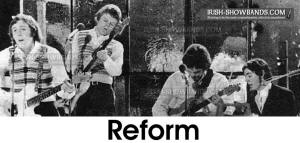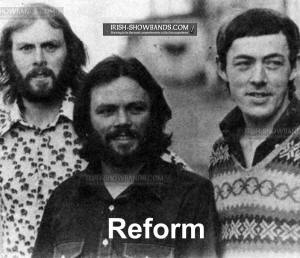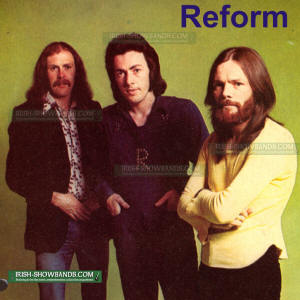Reform Feature (1968
- 1984)
Photo Gallery -
Band Lineups -
Discography
- Audio samples -
Where Are They Now?
The Story
 Reform have to
be one of the most unique bands that ever played the
Irish ballroom circuit: 1) Because for most of their long history,
they were only a three piece group. 2) They played the ballroom circuit
successfully as a trio and 3) They were not from Dublin (a rarity on
the Irish group/rock scene).
Reform have to
be one of the most unique bands that ever played the
Irish ballroom circuit: 1) Because for most of their long history,
they were only a three piece group. 2) They played the ballroom circuit
successfully as a trio and 3) They were not from Dublin (a rarity on
the Irish group/rock scene).
Formed
in Limerick in early 1968. The original line up featured Don
O’Connor (drums, vocals), Noel Casey (bass), Joe Mulcahy (rhythm
guitar) and Willie Browne (vocals, lead guitar).
Willie had previously played with Limerick's Berwyn
Showband. The group's first gig was as part of a concert in
what is now the Belltable Arts Centre, it was then known as
Amharaclann na Feile. For the band's early history, they handled
their own affairs with Don O'Connor responsible for bookings and
publicity. In some early outings, the band were billed as "Willie
Browne and the Reforms" and sometimes, "The Reforms."
The first mention of the band we can
find in Spotlight was in August 1969, when their picture
appeared in Pat Egan's Beat column. Though the band was named under
the photo, it was not mentioned in the column itself. It would be
May, 1970 before they received a mention in Pat's column and he
identified them as a "Belfast band." It appears the band may still
have been a four piece at this time as the photo shown included the
four original members.
As an aside here, it is important to
mention that although showbands received good coverage in
Spotlight no matter where they originated, rock bands from
outside the Dublin scene had a lot tougher time getting a mention,
at least in the early days. The insular Dublin scene had enough
groups without bringing in rural groups until they became big
outside their own home towns. Such was the story with Reform.

By late 1970, the band had undergone
what might be termed a "major change" when bass player Noel Casey
left and Joe Mulcahy moved from rhythm guitar to the bass, now
making the band a trio. This would be the line-up for the rest of
their time together.
We can find little info at this time
about the band's early days. We can only assume they toiled away in
relative obscurity (from a national perspective) continuing to hone
their skills and build a following around their native Limerick and
the Southwest. However, in November, 1971, Pat Egan stated in his
column that the band was "Ireland's most popular pop rock band. In
every dancing venue outside of the ballroom circuit, the Limerick
band are the biggest draw. Having checked ten country venues about
who were the most popular group for dancing, the Reform came out on
top."
In 1972, they received the honour of being only the
second Irish group (after Alyce) to be featured on the prestigious
"Ken's Klub" radio programme on RTE (hosted by Ken
Stewart). The programme usually featured
showbands who came into the studio and performed 4-6 songs "live" for
later broadcast. It was unique in that it was as "live" as most
bands were ever heard (other than seeing them in person).
They also decided to get a manager as
the work of getting bookings, touring and writing and recording
became too much for them to handle themselves. Enter manager Oliver
Barry, whose organisation also looked after the Freshmen and the
Wolfe Tones. The band was playing a mixture of all music genres
including pop, progressive reggae, and some traditional Irish tunes.
It also appeared the band was ready to release their first single.
Pat Egan reported in February that their debut single might be a
reggae version of Buddy Holly's Learning the Game, as he had
heard some of their demo tapes. But this not to be.
In February,
the group performed their own composition,
I’m Gonna
Get You
in the Originality Spot on the RTE television programme
"Spin Off." The song overcame stiff competition from artists such as
The
Times
and
The
Others
to be voted number one.
I’m Gonna Get You
was released on CBS's Young Blood label in August of 1973, and was produced by Billy Brown of the Freshmen,
stable mates under manager Oliver Barry. Although they had signed a
five year deal with CBS, in an interview, they admitted they weren't
that happy with the single, but thought it might do well sales-wise.
By the time they released their first
single, the band had been on the road long enough to be supremely
confident about their music and their reputation. Said Don in a
Spotlight interview in September, "We're a good time band and by
that I mean we play music to give people a good time whether dancing
or just listening." Added bassist Joe, "Take into account that we
have had no record, very little publicity and only one major
concert gig with Focus. There's not a hall in the country where you
could say we played bad gigs."
 "Not
only that," added Willie, "we're walking a musician tightrope in
that we don't play any chart numbers yet still manage to have people
shouting for more." Concluded Don, "We're a commercial rock band and
have proved we can hold our own with even the best visiting British
bands." Strong words for a three piece group from Limerick at the
time. Their confidence was well founded as their single made the
Irish charts, rising to number 12 and barely missing a top ten spot,
a rarity for an Irish rock group outside of another trio, Thin
Lizzy.
"Not
only that," added Willie, "we're walking a musician tightrope in
that we don't play any chart numbers yet still manage to have people
shouting for more." Concluded Don, "We're a commercial rock band and
have proved we can hold our own with even the best visiting British
bands." Strong words for a three piece group from Limerick at the
time. Their confidence was well founded as their single made the
Irish charts, rising to number 12 and barely missing a top ten spot,
a rarity for an Irish rock group outside of another trio, Thin
Lizzy.
In April, 1974 the band released
their second single, One For The Boys, which despite a major
publicity campaign, did not follow its predecessor into the charts.
Later that year, the band caused some controversy when leader
Don O'Connor was featured
in Spotlight complaining to the weekly entertainment
magazine that their "rock" coverage was heavily influenced by a non
existent Dublin rock scene. "We are faced each week," wrote Don,
"with this stuff about the break-up of some previously unheard of
rock group or a write-up on some Cat's Pyjamas or others who haven't
got the price of a van." Meanwhile, rural working bands like Reform
were totally ignored (full
article below).
In 1978, Reform performed their own composition, “You
Gotta' Get Up”,
in the National Song Contest but were pipped by Colm Wilkinson
performing “Born
To Sing”.
Colm went on to represent Ireland in that year's Eurovision Song
Contest. The band's recording of the song made the Irish Top ten
peaking at number 3. At the time, still an unusual feat for an Irish
rock
Band, especially one based outside of Dublin.
To mark the 25th Anniversary of Buddy
Holly’s death in 1984, the group were invited by the Limerick Rock
‘n’ Roll Club to top the bill at their Buddy Holly Convention. To
honour the memory of Buddy Holly the group recorded a medley of
Holly’s tunes. This recording was never issued commercially.
Reform played their final gig on August 31, 1984 at
the CYMS Hall, Killorglin, Co. Kerry.
Our thanks to the late Eddie Kelly for
his help with
the information in this article.
More to come.....
click on thumbnails for full image
